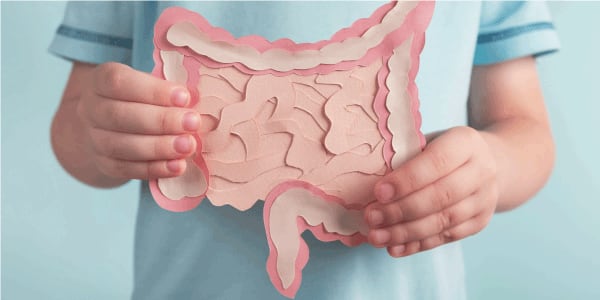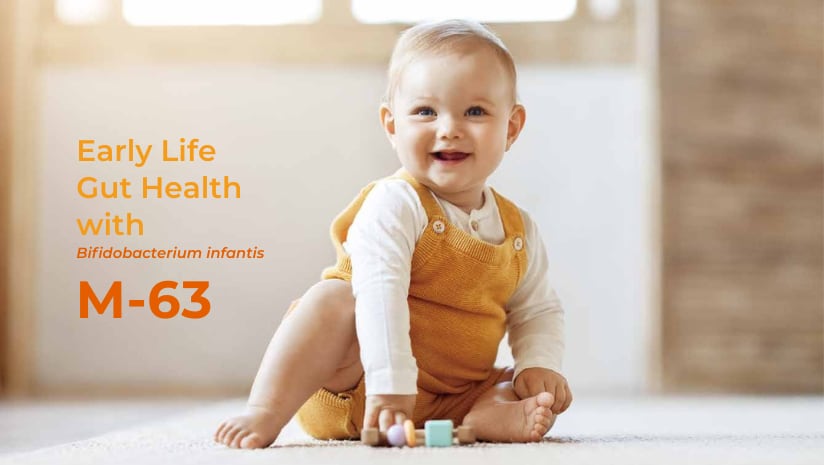The Covid-19 pandemic has changed our lives in multiple ways. With emerging evidence that the virus can cause alterations in the microbiota, supporting gut health has never been more important.
The human gut is the largest immune organ in the body and home to hundreds of trillions of microorganisms. The gut and the immune system are interconnected with 70-80% of the immune system existing in the gut.1 This means the gut microbiota can influence immune function and vice versa.
In the wake of the pandemic, increasing evidence suggests that the gut microbiota is associated with Covid-19 and the severity of the illness and that patients with Covid-19 are more likely to suffer from dysbiosis – an alteration in the gut microbiota – during and after contracting the virus, even though Covid-19 is primarily a respiratory illness.
Indeed, many respiratory viral illnesses are commonly accompanied by gastrointestinal tract (GI) symptoms. Previous studies during the SARS-CoV-1 outbreak in 2002 showed that diarrhoea was a common symptom, occurring in 16%-73% of patients.2 SARS was not only known to infect the epithelial cells of the respiratory tract but also the immune cells, triggering an intense immune response with elevation in Th2 cytokines.
Covid-19 in relation to dysbiosis
Studies have shown a decrease in microbial diversity in faecal samples of patients with Covid-19, accompanied by enrichment of opportunistic pathogens including Clostridium hathewayi and Ruminococcus species.3 Data from two studies that used metagenomic sequencing showed, among other findings, that several beneficial commensals – bacteria such as Bifidobacterium, Faecalibacterium prausnitzii and Eubacterium rectale which protects the gut from pathogens – were depleted in faecal samples of Covid-19 cases.4,5
In addition, faecal samples with high SARS-CoV-2 infectivity – the coronavirus strain that causes Covid-19 – had a higher abundance of pathogenic bacteria, such as Collinsella species, Morganella morganii, and a lower abundance of SCFA-producing bacteria, compared with samples with low SARS-CoV-2 viral infectivity. These findings indicate that gut dysbiosis with an enrichment of pathogenic bacteria and depletion of beneficial commensals is closely related to disease severity in Covid-19.
Severity and post infection of Covid-19
Factors affecting the severity of Covid-19 include old age, co-morbidities (such as obesity, diabetes, cardiovascular disease and inflammatory disorders), as well as other risks including auto-immune conditions and weakened immune systems. A study published in the British Medical Journal investigated whether the gut microbiome is linked to disease severity in patients with Covid-19, and whether perturbations in microbiome composition, if any, resolve with clearance of the virus.6 It concluded that associations between gut microbiota composition, levels of cytokines and inflammatory markers in patients with Covid-19 suggested that the gut microbiome is involved in the magnitude of Covid-19 severity. Furthermore, even after disease resolution of the acute episode, dysbiosis could contribute to persistent symptoms.

Indeed, lingering effects following infection of Covid-19 in some individuals have been widely reported. Over 80% of Covid-19 patients have persistent symptoms known as post–acute Covid-19 syndrome, or long Covid, and/or a developed multisystem inflammation after viral clearance.7 This correlates with multiple studies that report a marked difference in gut microbiota between recovered patients and healthy adults, with dysbiosis persisting up to 30 days after disease resolution.8,9
The wider impact on microbiota
As leading experts continue to observe, the pandemic serves as a reminder that we live in a microbial world where microbes have a significant impact on our daily existence and health.10 Covid-19 has substantially impacted the microbial landscape and, as a consequence, human health over the long term. Controlled restrictions during lockdowns and the enforcement of strict hygiene, physical separation and travel barriers, which in turn impacted changes to mood and diets, have all contributed to a longstanding loss in overall microbial diversity and inability for reinoculation, resulting in gut disorders, compromised immune systems, poor mental health and weight gain.
Early life gut microbiota have been affected, too. Birth and early infancy known to be key periods for the establishment of the microbiome and increased rates of delivery by Caesarean section and discouraging skin-to-skin contact when breastfeeding11 in Covid-19-positive women have also been shown to have impacted early microbiota development in newborns.

The role of probiotics
As medical experts continue to investigate the many effects of Covid-19, consumer awareness towards health and wellness continues to grow. A recent market analysis report confirmed the pandemic resulted in a ‘major spike’ in demand for immunity-boosting food products and supplements, such as probiotics.12 Probiotics are known for their immunity-boosting properties and offer protection against gastrointestinal pathogens while promoting the production of natural antibodies in the body.
Clinical evidence already suggests that certain strains of probiotics can benefit people throughout life, helping to prevent common GI and respiratory infections (RTIs).13 Another study has considered whether differences in gut microbiome and associated immune cell programming can influence individual host responses to SARS-CoV2 infection. After all, the study noted, altering the microbiome composition through oral probiotics has been shown to alter the course and severity of other respiratory infections, such as influenza.14 It is perhaps unsurprising, therefore, that the global probiotics market is soaring; in 2021, it was valued at USD $58.17 bn and is expected to grow by 7.5% (CAGR) between 2021 to 2030.15
Maintaining the right balance of the gut microbiota, immune responses and the key metabolites such as short-chain fatty acids and vitamins, are vital for health and as the pandemic reshapes the probiotics landscape in relation to the gut, the use of certain strains is becoming increasingly more targeted. Morinaga’s Human Residential Bifidobacteria (HRB) strains have been clinically proven to positively support immune health, weight management and early-life gut colonization.
B. longum BB536 A multifunctional probiotic, promoting healthy ageing in the elderly as well as immune development and anti-allergy benefits in infants and children. BB536 has gained world recognition and is used as a functional food ingredient in various products, such as milk-based drink, yogurt, infant formula, and nutritional supplements and has been marketed in over 30 countries for more than 40 years.
B. breve M-16V Supplementation with M-16V is specifically beneficial at reducing the risk of allergic disorders in infants as well as protecting vulnerable preterm infants against premature birth complications such as necrotizing enterocolitis (NEC) and sepsis. M-16V has been demonstrated to promote early gut microbial colonization as a means to support healthy growth and to shape a healthy gastrointestinal and immune system.
B. infantis M-63 M-63 is considered a probiotics strain that is well-adapted to the intestinal environment of humans, especially infants. Ingestion of M-63 is specifically effective at improving the colonization of bifidobacteria in infant gut and potentially beneficial at improving gut well-being and mental state.
B. breve B-3 Lifestyle factors such as diet high in junk food, stress, lack of sleep and exercise can all contribute to gut dysbiosis. Accumulating evidence suggests an association between gut microbiota and the development of obesity and introduces the benefits of probiotics administration as a therapeutic approach. B-3 is a probiotic strain that focuses on the relationship between gut microbiota and metabolic syndrome across multiple consumer segments and health areas. It can help maintain healthy body composition and can be incorporated into various applications such as food products and nutritional supplements, from chocolate and capsules to protein powders and cereals.

References
1. Wiertsema S.P., van Bergenhenegouwen J., Garssen J., et al. The Interplay between the Gut Microbiome and the Immune System in the Context of Infectious Diseases throughout Life and the Role of Nutrition in Optimizing Treatment Strategies (2021, March).
2. Ikram Hussain I., Cher G.L.Y., Abbas Abid M., et al. Role of Gut Microbiome in COVID-19: An Insight Into Pathogenesis and Therapeutic Potential Front. Immunol. (2021, October).
3. Cheuk-Hay Lau H., NG S.C., Yu J. Targeting the Gut Microbiota in Coronavirus Disease 2019: Hype or Hope? (2021, September).
4. Yeoh Y.K., Zuo T., Lui G.C-Y, et al. Gut 2021;70:698-706.Gut microbiota composition reflects disease severity and dysfunctional immune responses in patients with COVID-19. (2021, January).
5, 9. Zuo T., Zhang F., Lui G.C.Y., et al. Alterations in gut microbiota of patients with COVID-19 during time of hospitalization. Gastroenterology. 2020 Sep;159(3):944-955.e8. doi: 10.1053/j.gastro.2020.05.048. Epub 2020 May 20. PMID: 32442562; PMCID: PMC7237927.
6. Yeoh Y.K, Zuo T, Lui G.C., et al. Gut microbiota composition reflects disease severity and dysfunctional immune responses in patients with Covid-19. Gut 2021;70:698-706.
7. Cheuk-Hay Lau H., NG S.C., Yu J. Targeting the gut microbiota in coronavirus disease 2019: hype or hope? DOI: doi.org/10.1053/j.gastro.2021.09.009. (2021, September).
8. Yeoh Y.K., Zuo T., Lui G.C., et al. Gut microbiota composition reflects disease severity and dysfunctional immune responses in patients with Covid-19. Gut (2021 April). 70(4):698-706. doi: 10.1136/gutjnl-2020-323020.
10. Finlay B.B., Amato K.R., Azad M., et al. The hygiene hypothesis, the Covid pandemic, and consequences for the human microbiome Proc Natl Acad Sci U S A. 2021 Feb 9;118(6):e2010217118. doi: 10.1073/pnas.2010217118. Erratum in: Proc Natl Acad Sci U S A. 2021 Mar 16;118(11): PMID: 33472859; PMCID: PMC8017729.
11. Fehr K., Moossavi S., Sbihi H., et al. Breastmilk feeding practices are associated with the co-occurrence of bacteria in mothers’ milk and the infant gut: Cell Host Microbe (2020, August). 12;28(2):285-297.e4. doi: 10.1016/j.chom.2020.06.009. Epub 2020 Jul 10. PMID: 32652062.
13. Guillemard E., Tanguy J., Flavigny A., et al. Effects of consumption of a fermented dairy product containing the probiotic Lactobacilluscasei DN-114 001 on common respiratory and gastrointestinal infections in shift workers in a randomized controlled trial. J Am Coll Nutr. 2010;29:455–468. doi: 10.1080/07315724.2010.10719882 (October 2010).
14. Mak J.W.Y., Chan F.K.L., Ng S.C. Probiotics and COVID-19: One size does not fit all. Lancet Gastroenterol Hepatol. 2020 Jul;5(7):644-645. doi: 10.1016/S2468-1253(20)30122-9. Epub 2020 Apr 25. PMID: 32339473; PMCID: PMC7182525 (2020, April).








